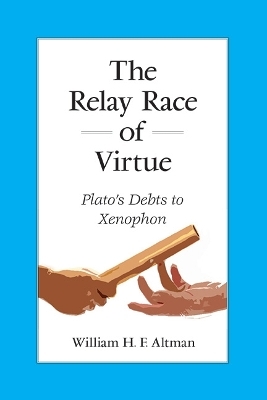
The Relay Race of Virtue
Plato's Debts to Xenophon
Seiten
2022
State University of New York Press (Verlag)
978-1-4384-9091-5 (ISBN)
State University of New York Press (Verlag)
978-1-4384-9091-5 (ISBN)
Demonstrates that Plato and Xenophon ought to be regarded less as rivals and more as engaged in a dialogue advancing a common goal of preserving the Socratic legacy.
The ancient view that Plato and Xenophon were rivals at least had the merit of allowing them to respond to each other; in modern times, the view that Plato wrote first eliminates the possibility of an exchange between the only two Socratics whose writings are preserved intact. Challenging the chronological assumptions on which Plato's across-the-board priority currently rests, the purpose of The Relay Race of Virtue is to show that Plato and Xenophon were responding to each other and that we can gain a greater appreciation for both by recognizing the back-and-forth nature of their friendly dialogue. Instead of regarding Xenophon as Plato's inept copyist, William H. F. Altman presents him as first blazing the trail for his fellow Socratic and then learning from Plato in return. By emphasizing "Plato's Debts to Xenophon," Altman is charitable to both, justifying Socrates' belief (Memorabilia 1.2.8) "that those of his companions who adopted his principles of conduct would throughout life be good friends to him and to each other."
The ancient view that Plato and Xenophon were rivals at least had the merit of allowing them to respond to each other; in modern times, the view that Plato wrote first eliminates the possibility of an exchange between the only two Socratics whose writings are preserved intact. Challenging the chronological assumptions on which Plato's across-the-board priority currently rests, the purpose of The Relay Race of Virtue is to show that Plato and Xenophon were responding to each other and that we can gain a greater appreciation for both by recognizing the back-and-forth nature of their friendly dialogue. Instead of regarding Xenophon as Plato's inept copyist, William H. F. Altman presents him as first blazing the trail for his fellow Socratic and then learning from Plato in return. By emphasizing "Plato's Debts to Xenophon," Altman is charitable to both, justifying Socrates' belief (Memorabilia 1.2.8) "that those of his companions who adopted his principles of conduct would throughout life be good friends to him and to each other."
William H. F. Altman is an independent scholar and the author of a five-volume study of Plato’s dialogues.
Preface: How Xenophon led Chion of Heraclea to the Academy
Introduction: Standing on the Shoulders of Giants
1. Xenophon in Plato’s Dialogues
2. Xenophon’s Debts to Plato
3. Ordering Xenophon’s Writings
4. Plato’s Debts to Xenophon
5. A Socratic Relay Race
Notes
Bibliography
Index
| Erscheinungsdatum | 10.10.2022 |
|---|---|
| Reihe/Serie | SUNY series in Ancient Greek Philosophy |
| Zusatzinfo | Total Illustrations: 2 |
| Verlagsort | Albany, NY |
| Sprache | englisch |
| Maße | 152 x 229 mm |
| Gewicht | 227 g |
| Themenwelt | Geisteswissenschaften ► Philosophie ► Ethik |
| Geisteswissenschaften ► Philosophie ► Philosophie Altertum / Antike | |
| ISBN-10 | 1-4384-9091-7 / 1438490917 |
| ISBN-13 | 978-1-4384-9091-5 / 9781438490915 |
| Zustand | Neuware |
| Haben Sie eine Frage zum Produkt? |
Mehr entdecken
aus dem Bereich
aus dem Bereich


